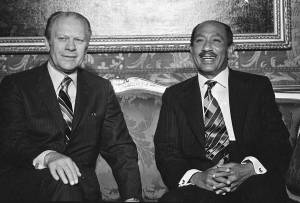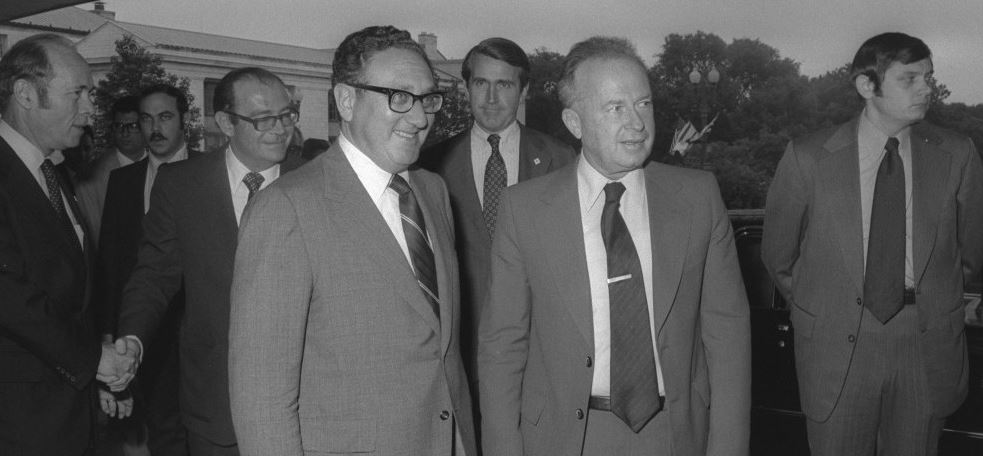
Egyptian President Anwar Sadat (R) and US President Gerald Ford in Washington in 1975. (AP)
On March 18, 1975, the US undertook a “reassessment” of its relationship with Israel, creating enormous tension between the executive branch and the Israeli government.
In the aftermath of the October 1973 Yom Kippur War, US diplomacy engaged Egypt and Israel in a series of negotiations to separate their respective armies and prevent another outbreak of conflict. US Secretary of State Henry Kissinger pushed hard for Israeli withdrawal from Sinai, particularly from the strategic Sinai passes and Sinai oil fields.
Israeli Prime Minister Rabin told Kissinger that in order for the Israeli government to undertake such a withdrawal – and get it through the Knesset – he would need Egyptian President Anwar Sadat to agree that “Egypt and Israel undertake not to resort to the use of force and to resolve all disputes between them by negotiations and other peaceful means. They will refrain from permitting, encouraging, assisting, or participating in any military, paramilitary or hostile actions, from any warlike or hostile acts and any other form of warfare or hostile activity against the other party anywhere.”
Sadat balked because he felt that these conditions were tantamount to signing a treaty with Israel while Israel was still in possession of the Sinai. A diplomatic impasse ensued. Kissinger claimed that Rabin and the Israelis were unreasonable.
US President Gerald Ford told Kissinger that the US would not “isolate itself from the rest of the world to stand behind Israeli intransigence.”
For Israel, it was a question of returning significant territory for something less than a full peace.
Kissinger Freezes Arms Deliveries to Israel
From March 1975 until late summer that year, the US undertook a “reassessment” of the Washington-Israel Relationship, creating enormous tension between the executive branch and the Israeli government. Kissinger froze arms deliveries to Israel, particularly F-15 aircraft, and recommended that “every department should put Israeli activities at the bottom of the list.”
The Senate, led by Washington Senator Scoop Jackson, strongly supported Israel in its tussle with the White House, forcing Ford and Kissinger to relent. On September 1, Israel and Egypt signed another separation of forces agreement, reflecting Israel’s terms. Israel showed a hard resolve not to succumb to pressure to make territorial withdrawals it deemed too dangerous and for too little in return diplomatically.
Source: Center for Israel Education

Sign the Declaration to Keep Jerusalem United
Jerusalem Must Remain the United Capital of Israel
I declare that Jerusalem is the eternal capital of the Jewish People and support all efforts to maintain and strengthen a united Jerusalem as the undivided capital of the State of Israel.
See our Privacy Policy